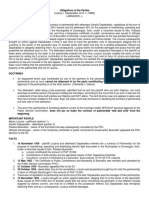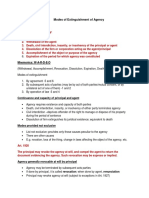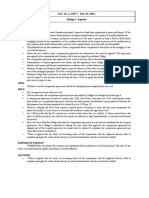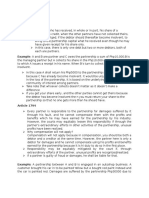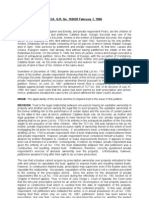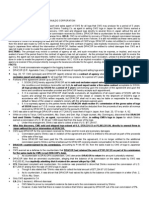Siredy Enterprises Vs CA
Siredy Enterprises Vs CA
Uploaded by
posh cbCopyright:
Available Formats
Siredy Enterprises Vs CA
Siredy Enterprises Vs CA
Uploaded by
posh cbOriginal Description:
Original Title
Copyright
Available Formats
Share this document
Did you find this document useful?
Is this content inappropriate?
Copyright:
Available Formats
Siredy Enterprises Vs CA
Siredy Enterprises Vs CA
Uploaded by
posh cbCopyright:
Available Formats
SIREDY ENTERPRISES, INC. petitioner, vs. HON. COURT OF APPEALS and CONRADO DE GUZMAN,respondents.
G.R. No. 129039. September 17, 2002
FACTS:
Private respondent Conrado De Guzman is an architect-contractor doing business under the name and style of Jigscon
Construction. Herein petitioner Siredy Enterprises, Inc. (hereafter Siredy) is the owner and developer of Ysmael Village, a
subdivision in Sta. Cruz, Marilao, Bulacan. The president of Siredy is Ismael E. Yanga.
Yanga executed an undated Letter of Authority authorizing one Hermogenes Santos to do the following acts:
1. To negotiate and enter into contract or contracts to build Housing Units on our subdivision lots in Ysmael Village, Sta.
Rosa, Marilao, Bulacan.
2. To sell lots on our subdivisions and;
3. To represent us, intercede and agree for or make agreements for all payments in our favor, provided that actual
receipts thereof shall be made by the undersigned.
Santos entered into a Deed of Agreement with De Guzman regarding the construction of residential units. The latter
constructed 26 residential units at Ysmael Village. Thirteen (13) of these were fully paid but the other 13 remained
unpaid.
De Guzman tried but failed to collect the unpaid account from petitioner. Thus, he instituted the action below for specific
performance against Siredy, Yanga, and Santos who all denied liability.
During the trial, Santos disappeared and his whereabouts remain unknown.
Yanga asserts that it has no contract with De Guzman. The trial court agreed with petitioner Siredy Enterprise based on
the doctrine of privity of contract.
CA reversed the decision. The appellate court held that the Letter of Authority duly signed by Yanga clearly constituted
Santos as Siredys agent, whose authority included entering into a contract for the building of housing units at Ysmael
Village. Consequently, Siredy cannot deny liability for the Deed of Agreement with private respondent De Guzman, since
the same contract was entered into by Siredys duly designated agent, Santos. There was no need for Yanga himself to
be a signatory to the contract, for him and Siredy to be bound by the terms thereof.
ISSUE:
Whether or not Hermogenes B. Santos was a duly constituted agent of Siredy, with authority to enter into contracts and capacity to
bind Siredy to the Deed of Agreement. YES
RULING:
The authority of the agent to act emanates from the powers granted to him by his principal; his act is the act of the
principal if done within the scope of the authority.
On its face, the instrument executed by Yanga clearly and unequivocally constituted Santos to do and execute, among
other things, the act of negotiating and entering into contract or contracts to build Housing Units on our subdivision lots in Ysmael
Village, Sta. Rosa, Marilao, Bulacan.[ Nothing could be more express than the written stipulations contained therein.
We find that a valid agency was created between Siredy and Santos, and the authority conferred upon the latter includes
the power to enter into a construction contract to build houses such as the Deed of Agreement between Santos and De Guzmans
Jigscon Construction. Hence, the inescapable conclusion is that Siredy is bound by the contract through the representation of its
agent Santos.
Moreover, even if arguendo Santos mandate was only to sell subdivision lots as Siredy asserts, the latter is still bound to
pay De Guzman. De Guzman is considered a third party to the agency agreement who had no knowledge of the specific instructions
or agreements between Siredy and its agent.
The scope of the agents authority is what appears in the written terms of the power of attorney. While third persons are
bound to inquire into the extent or scope of the agents authority, they are not required to go beyond the terms of the written power
of attorney. Third persons cannot be adversely affected by an understanding between the principal and his agent as to the limits of
the latters authority. In the same way, third persons need not concern themselves
You might also like
- Sample SOW - Security ServicesDocument14 pagesSample SOW - Security ServicesLongLacHong100% (1)
- Orient Air Vs Court of Appeals Case Digest On AgencyDocument1 pageOrient Air Vs Court of Appeals Case Digest On Agencykikhay1180% (5)
- Digest of Litonjua, Jr. v. Eternit Corp. (G.R. No. 144805)Document2 pagesDigest of Litonjua, Jr. v. Eternit Corp. (G.R. No. 144805)Rafael Pangilinan100% (9)
- Annulment of International Arbitration Awards ICSIDDocument166 pagesAnnulment of International Arbitration Awards ICSIDHerbert Girón LemusNo ratings yet
- 28 Day Ramadan Weight Loss Meal PlanDocument12 pages28 Day Ramadan Weight Loss Meal Planposh cbNo ratings yet
- (Digest) Angeles V PNRDocument2 pages(Digest) Angeles V PNRGRNo ratings yet
- Angeles vs. PNR DigestDocument1 pageAngeles vs. PNR Digestmansikiabo67% (3)
- ATP MORAN vs. CADocument2 pagesATP MORAN vs. CARomnick Jesalva100% (1)
- Sally Yoshizaki Vs Joy Trining Center of Aurora, Inc., G.R. No. 174978 DigestDocument2 pagesSally Yoshizaki Vs Joy Trining Center of Aurora, Inc., G.R. No. 174978 DigestKarmille Buenacosa100% (2)
- Gold Star Mining v. Lim JimenezDocument4 pagesGold Star Mining v. Lim JimenezJune Vincent Ferrer IIINo ratings yet
- Catalan vs. Gatchalian 105 Phil. 1270Document2 pagesCatalan vs. Gatchalian 105 Phil. 1270jhammy50% (2)
- Tocao and Belo v. Anay Case DigestDocument2 pagesTocao and Belo v. Anay Case DigestAndrewNo ratings yet
- Mod1 - 1 - G.R. No. 41182-3 Sevilla V CADocument2 pagesMod1 - 1 - G.R. No. 41182-3 Sevilla V CAOjie SantillanNo ratings yet
- 14-ATP-Escueta vs. LimDocument2 pages14-ATP-Escueta vs. LimJoesil DianneNo ratings yet
- Ching vs. Bantolo, G.R. No. 177086 - Case Digest (Contract of Agency Coupled With Interest)Document2 pagesChing vs. Bantolo, G.R. No. 177086 - Case Digest (Contract of Agency Coupled With Interest)Alena Icao-AnotadoNo ratings yet
- Buncio and Co V Ong GuanDocument1 pageBuncio and Co V Ong GuanAbraham GuiyabNo ratings yet
- 08 Aguila Vs CADocument1 page08 Aguila Vs CANichole LanuzaNo ratings yet
- Uy v. Puzon (G.R. No. L-19819)Document4 pagesUy v. Puzon (G.R. No. L-19819)Rache GutierrezNo ratings yet
- #Dominion Insurance V CADocument2 pages#Dominion Insurance V CAKareen Baucan100% (1)
- Dominion Insurance Corp. v. Court of AppealsDocument3 pagesDominion Insurance Corp. v. Court of AppealsLoruel Kyle Nadayag100% (1)
- Diolosa V CADocument2 pagesDiolosa V CABettinaaaNo ratings yet
- Antonio C. Goquiolay and The Partnership "Tan Sin An and Antonio C. Goquiolay vs. Washington Z. Sycip, Et Al. G.R. No. L-11840, July 26, 1960Document6 pagesAntonio C. Goquiolay and The Partnership "Tan Sin An and Antonio C. Goquiolay vs. Washington Z. Sycip, Et Al. G.R. No. L-11840, July 26, 1960Brent TorresNo ratings yet
- 3cd - Hahn vs. CA & BMW - Atty. Velos - DensingDocument1 page3cd - Hahn vs. CA & BMW - Atty. Velos - DensingmansikiaboNo ratings yet
- Trust 16-20 Case DigestsDocument6 pagesTrust 16-20 Case DigestsLeng Villeza50% (2)
- Heirs of Moreno v. MCIAADocument2 pagesHeirs of Moreno v. MCIAAAphr100% (1)
- Rural Bank of Borbon (Camarines Sur), Inc. v. CADocument2 pagesRural Bank of Borbon (Camarines Sur), Inc. v. CARuben100% (1)
- Case Summary: Obligations of The PartiesDocument2 pagesCase Summary: Obligations of The Partieskim_santos_20100% (1)
- Uy vs. Puzon Case DigestDocument2 pagesUy vs. Puzon Case DigestOjam Flora100% (1)
- Coleongco v. Claparols (1964)Document2 pagesColeongco v. Claparols (1964)Jenny Mary DagunNo ratings yet
- Estanislao V CA - AgencyDocument2 pagesEstanislao V CA - AgencyDawn BernabeNo ratings yet
- Modes of Extinguishment of AgencyDocument6 pagesModes of Extinguishment of AgencyDan Abania100% (2)
- Philippine National Bank vs. Court of Appeals G.R. No. 97995 - January 21, 1993 FactsDocument5 pagesPhilippine National Bank vs. Court of Appeals G.R. No. 97995 - January 21, 1993 FactsPatricia SanchezNo ratings yet
- Tai Tong Vs Insurance CommissionDocument2 pagesTai Tong Vs Insurance Commission001noone100% (2)
- George Litton V Hill and Ceron, G.R. No. L45624, April 25, 1939-DigestedDocument1 pageGeorge Litton V Hill and Ceron, G.R. No. L45624, April 25, 1939-DigestedRaymer OclaritNo ratings yet
- Agency - Sevilla vs. CA 160 SCRA 171Document2 pagesAgency - Sevilla vs. CA 160 SCRA 171Maria Fiona Duran Merquita100% (4)
- Citystate Savings Bank V TobiasDocument2 pagesCitystate Savings Bank V TobiasSha Santos100% (1)
- De La Rosa Vs Go-Cotay - and - Villareal Vs RamirezDocument2 pagesDe La Rosa Vs Go-Cotay - and - Villareal Vs RamirezHannah DeskyNo ratings yet
- Manila Remnant Vs CADocument2 pagesManila Remnant Vs CARobert Ramirez100% (2)
- 09 Campos Rueda Vs Pacific CommercialDocument1 page09 Campos Rueda Vs Pacific CommercialNichole LanuzaNo ratings yet
- Digest Sps Viloria v. CalDocument3 pagesDigest Sps Viloria v. CalGR0% (1)
- G.R. No. L-18377. Dec 29, 1962.: Duñgo v. LopenaDocument1 pageG.R. No. L-18377. Dec 29, 1962.: Duñgo v. LopenaHazel P.100% (1)
- Goquiolay v. Sycip GR No. L-11840 July 26, 1960 FactsDocument2 pagesGoquiolay v. Sycip GR No. L-11840 July 26, 1960 FactsJoesil Dianne SempronNo ratings yet
- Bordador v. LuzDocument2 pagesBordador v. LuzdelayinggratificationNo ratings yet
- Imson Vs CA - InsuranceDocument1 pageImson Vs CA - InsuranceAllen Michael B. EscuderoNo ratings yet
- Banate Vs Phil Country SideDocument2 pagesBanate Vs Phil Country SideAnonymous TCXV3yTgqb80% (5)
- Advent Capital Vs AlcantaraDocument2 pagesAdvent Capital Vs AlcantaraXhome ZomNo ratings yet
- Clavecilla V AntillonDocument1 pageClavecilla V AntillonJL A H-Dimaculangan100% (1)
- Council of Redmen - DigestDocument1 pageCouncil of Redmen - DigestXing Keet Lu100% (1)
- Eduardo Lintonjua vs. Eternit Corp. Case DigestDocument3 pagesEduardo Lintonjua vs. Eternit Corp. Case DigestMarianne Hope Villas100% (1)
- Evangelista v. Abad SantosDocument2 pagesEvangelista v. Abad SantosCourtney TirolNo ratings yet
- Tuason vs. OrozcoDocument2 pagesTuason vs. Orozcoshinjha73100% (1)
- Digest of Manila Memorial Park Cemetery, Inc. v. Linsangan (G.R. No. 151319)Document2 pagesDigest of Manila Memorial Park Cemetery, Inc. v. Linsangan (G.R. No. 151319)Rafael PangilinanNo ratings yet
- Harry Keeler Electric Co. v. Rodriguez, G.R. No. L-19001, November 11, 1922 - DUENASDocument2 pagesHarry Keeler Electric Co. v. Rodriguez, G.R. No. L-19001, November 11, 1922 - DUENASJong PerrarenNo ratings yet
- Article 1793Document2 pagesArticle 1793JudyNo ratings yet
- Vda de Esconde Vs CA DigestDocument1 pageVda de Esconde Vs CA DigestshamymyNo ratings yet
- GR No. 82978Document1 pageGR No. 82978shezeharadeyahoocomNo ratings yet
- MACDONALD v. NATIONAL CITY BANK OF NY G.R. No. L-7991. May 21, 1956Document2 pagesMACDONALD v. NATIONAL CITY BANK OF NY G.R. No. L-7991. May 21, 1956SSNo ratings yet
- CMS Logging v. CADocument3 pagesCMS Logging v. CApurplebasketNo ratings yet
- Case Digest - Harry E. Keeler Electric Co. Vs Rodriguez, 44 Phil 19Document2 pagesCase Digest - Harry E. Keeler Electric Co. Vs Rodriguez, 44 Phil 19Maxene Pigtain100% (2)
- Siredy Enterprises, Inc. V CADocument1 pageSiredy Enterprises, Inc. V CARufhyne DeeNo ratings yet
- Agency DigestsDocument4 pagesAgency DigestsChanel GarciaNo ratings yet
- Siredy Enterprises, Inc. vs. Court of AppealsDocument7 pagesSiredy Enterprises, Inc. vs. Court of AppealsAJ AslaronaNo ratings yet
- 2002 - Agency, Trust, PartnershipDocument3 pages2002 - Agency, Trust, PartnershipUnsolicited CommentNo ratings yet
- Ledesma Vs Intestate Estate of PedrosaDocument1 pageLedesma Vs Intestate Estate of Pedrosaposh cb100% (1)
- Amelia Quiazon vs. Lourdes BelenDocument3 pagesAmelia Quiazon vs. Lourdes Belenposh cbNo ratings yet
- Spec Pro 2Document10 pagesSpec Pro 2posh cbNo ratings yet
- People Vs PrunaDocument2 pagesPeople Vs Prunaposh cb100% (1)
- MFR Goquiolay Vs SycipDocument2 pagesMFR Goquiolay Vs SycipJoel MilanNo ratings yet
- Law On Insurance 5:30-7:30 (Saturday) : Hasnia Pangarungan CasanDocument2 pagesLaw On Insurance 5:30-7:30 (Saturday) : Hasnia Pangarungan Casanposh cbNo ratings yet
- Apex Mining Vs SEMDocument1 pageApex Mining Vs SEMposh cbNo ratings yet
- Tax ProvisionsDocument49 pagesTax Provisionsposh cbNo ratings yet
- Myree's Ultimate Three Cheese Spread: Don't Subscribe To Hoopla Kids!Document1 pageMyree's Ultimate Three Cheese Spread: Don't Subscribe To Hoopla Kids!posh cbNo ratings yet
- Exploitation and Discrimination Act.") - As Used in This Act, ItDocument3 pagesExploitation and Discrimination Act.") - As Used in This Act, Itposh cbNo ratings yet
- Fort Bonifacio Vs Yllas LendingDocument4 pagesFort Bonifacio Vs Yllas Lendingposh cbNo ratings yet
- Estate of Dulay Vs Aboitiz (Digest)Document2 pagesEstate of Dulay Vs Aboitiz (Digest)posh cbNo ratings yet
- Tuason Vs BolanosDocument1 pageTuason Vs Bolanosposh cbNo ratings yet
- Liwanag Vs CADocument1 pageLiwanag Vs CAposh cbNo ratings yet
- Presidential Decree No. 1853Document1 pagePresidential Decree No. 1853posh cbNo ratings yet
- Trap Rock Industries, Inc. v. Local 825, International Union of Operating Engineers, Afl-Cio, 982 F.2d 884, 3rd Cir. (1992)Document13 pagesTrap Rock Industries, Inc. v. Local 825, International Union of Operating Engineers, Afl-Cio, 982 F.2d 884, 3rd Cir. (1992)Scribd Government DocsNo ratings yet
- HubenerDocument17 pagesHubenerpvtNo ratings yet
- R Square Project PresentationDocument54 pagesR Square Project Presentationava1234567890No ratings yet
- A059 Rajeev Tekwani (Evidence)Document26 pagesA059 Rajeev Tekwani (Evidence)Rajeev TekwaniNo ratings yet
- Sightreading Jazz Bass Clef Etudes PDFDocument18 pagesSightreading Jazz Bass Clef Etudes PDFTerem Tebauta100% (1)
- 81 Young V Midland Textile InsuranceDocument2 pages81 Young V Midland Textile Insurancekarl doceoNo ratings yet
- Global Project Finance Guide 2023 CompressedDocument251 pagesGlobal Project Finance Guide 2023 Compressedcerohad333No ratings yet
- Diesel V UPSIDocument12 pagesDiesel V UPSIMara Corteza San PedroNo ratings yet
- 3-NOAA APG - Evaluation ModuleDocument107 pages3-NOAA APG - Evaluation ModuleMasood AlamNo ratings yet
- KWCIPL Sub-Mandate FormatDocument3 pagesKWCIPL Sub-Mandate FormatKrishnan NarayanaswamyNo ratings yet
- Stare Decisis and Techniques of Legal Reasoning and Legal ArgumentDocument7 pagesStare Decisis and Techniques of Legal Reasoning and Legal ArgumentJaneSaraCabisonNo ratings yet
- G.R. No. L-35702 - Rubias v. BatillerDocument6 pagesG.R. No. L-35702 - Rubias v. BatillerMegan AglauaNo ratings yet
- Corporate Law in Pakistan: An OverviewDocument5 pagesCorporate Law in Pakistan: An OverviewmaniNo ratings yet
- Reliance Two Wheeler Package Policy - Schedule: Policy Number: 130422223120083478 Proposal/Covernote No: R17062217456Document6 pagesReliance Two Wheeler Package Policy - Schedule: Policy Number: 130422223120083478 Proposal/Covernote No: R17062217456Karthi KeyaNo ratings yet
- Provisional Sums vs. Prime CostsssdsdDocument23 pagesProvisional Sums vs. Prime CostsssdsdadamriswanNo ratings yet
- Cafeteria: Notice Inviting Tender (NIT)Document21 pagesCafeteria: Notice Inviting Tender (NIT)Viral TechNo ratings yet
- CD 0016 (Ap) PDFDocument1 pageCD 0016 (Ap) PDFALBA MILENANo ratings yet
- International Hardwood and Veneer Vs UPDocument13 pagesInternational Hardwood and Veneer Vs UPJohn Ludwig Bardoquillo PormentoNo ratings yet
- Part 4 RICS Construction Insurance Black BookDocument24 pagesPart 4 RICS Construction Insurance Black BookVasireddy BharatNo ratings yet
- Haldia Development Authority TenderDocument25 pagesHaldia Development Authority TenderArnab KhetoNo ratings yet
- Tourism Infrastructure and Enterprise Zone Authority vs. Global-V Builders Co., GR No. 219708Document24 pagesTourism Infrastructure and Enterprise Zone Authority vs. Global-V Builders Co., GR No. 219708Luigi JaroNo ratings yet
- District Survey Report For Sustainable Sand Mining Distt. Yamuna NagarDocument27 pagesDistrict Survey Report For Sustainable Sand Mining Distt. Yamuna Nagardeepak kumarNo ratings yet
- Supreme Court: Garcia, Iñigo & Ledesma Law Office For PetitionersDocument10 pagesSupreme Court: Garcia, Iñigo & Ledesma Law Office For PetitionersthebluesharpieNo ratings yet
- San Miguel Corporation vs. AballaDocument2 pagesSan Miguel Corporation vs. AballaRed CollinsNo ratings yet
- Siasat Vs IACDocument2 pagesSiasat Vs IACKent UgaldeNo ratings yet
- Case Doctrines For UribeDocument11 pagesCase Doctrines For Uribeamun dinNo ratings yet
- Supreme Court: The CaseDocument167 pagesSupreme Court: The CaseJpm JpmNo ratings yet
- Ogilvie - The Economics of GuildsDocument25 pagesOgilvie - The Economics of GuildsAmoxtliNo ratings yet


























